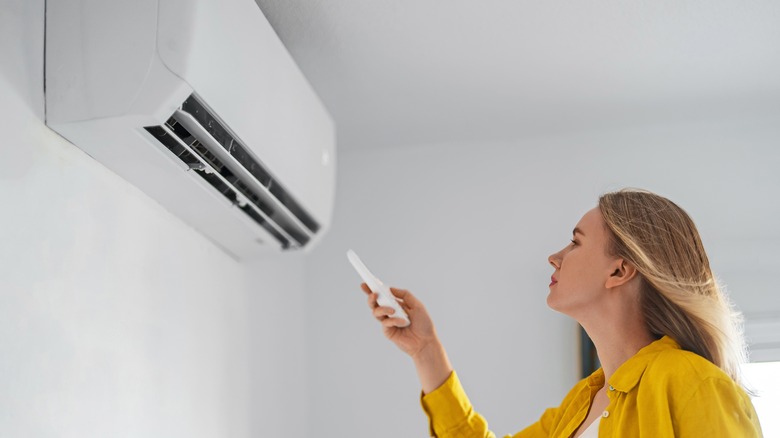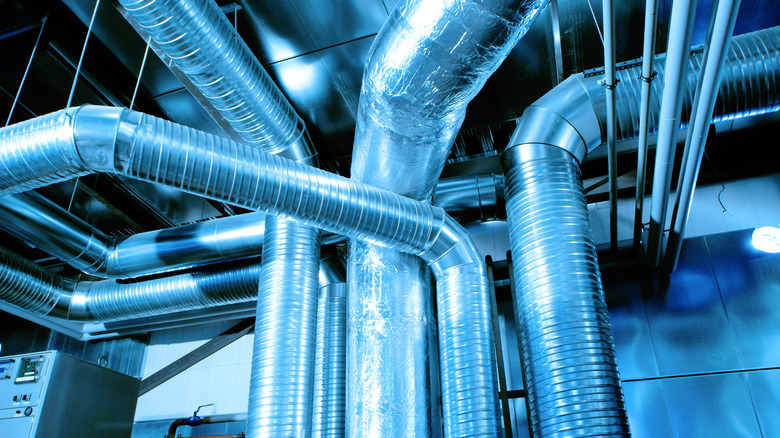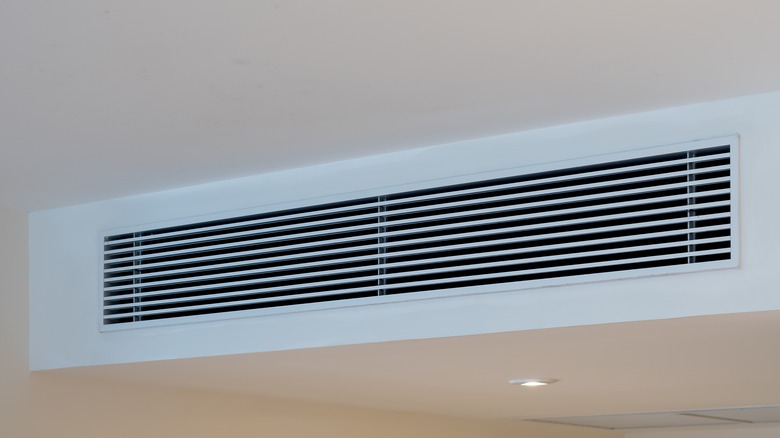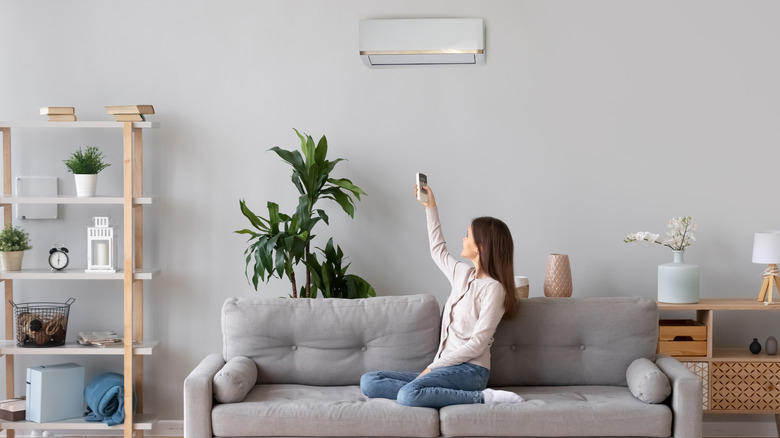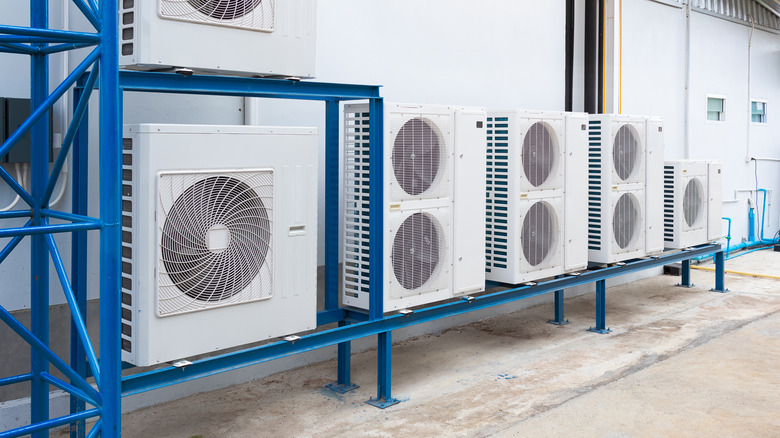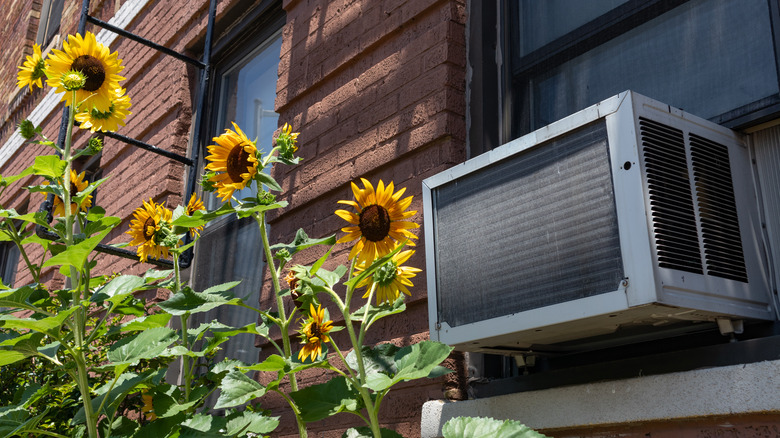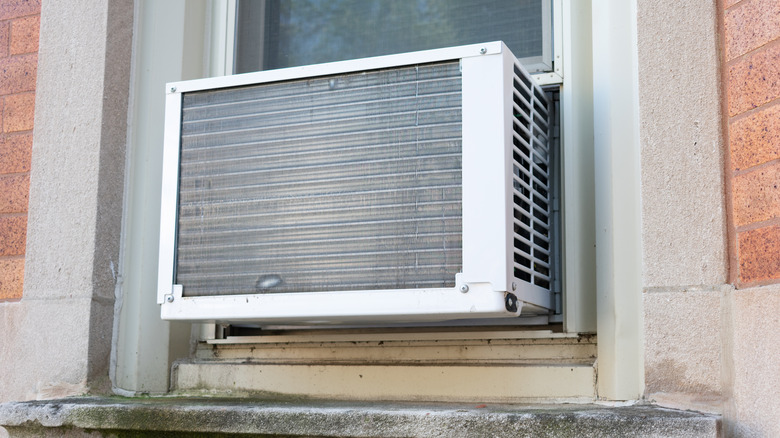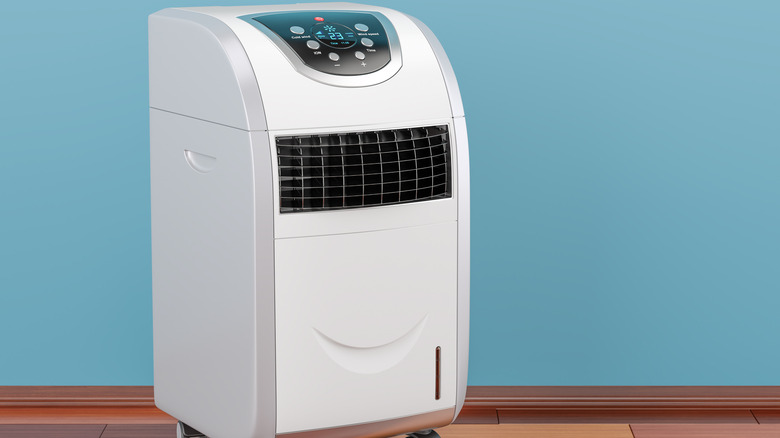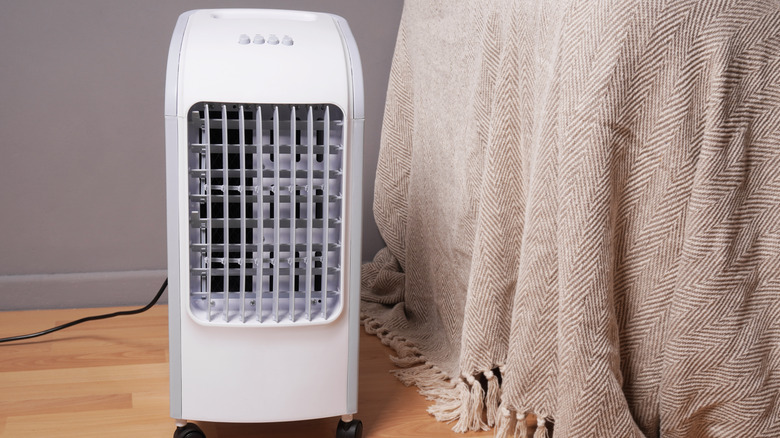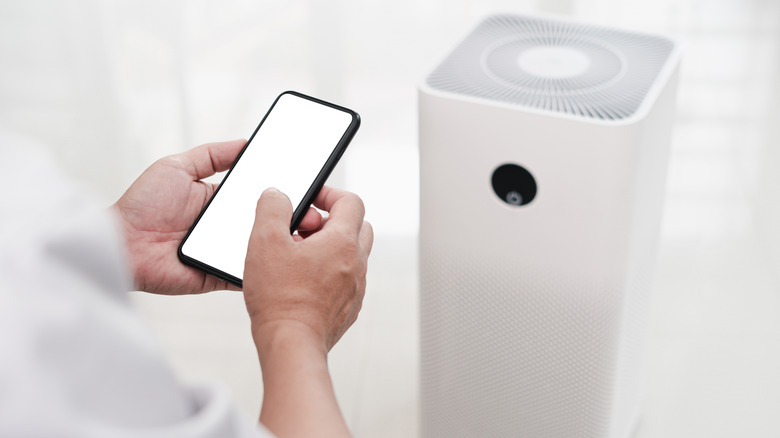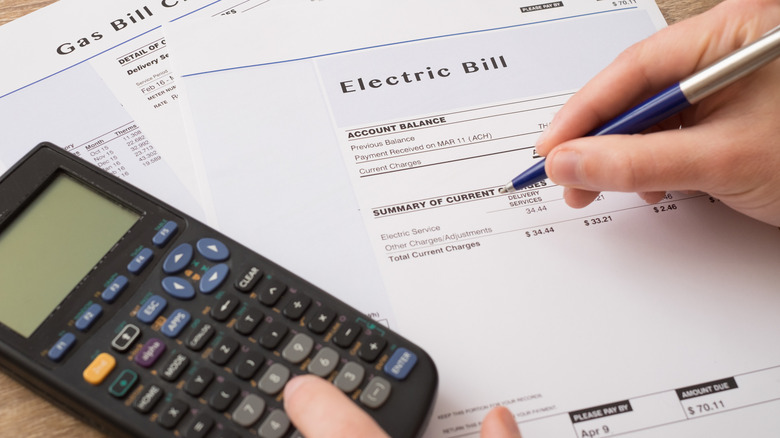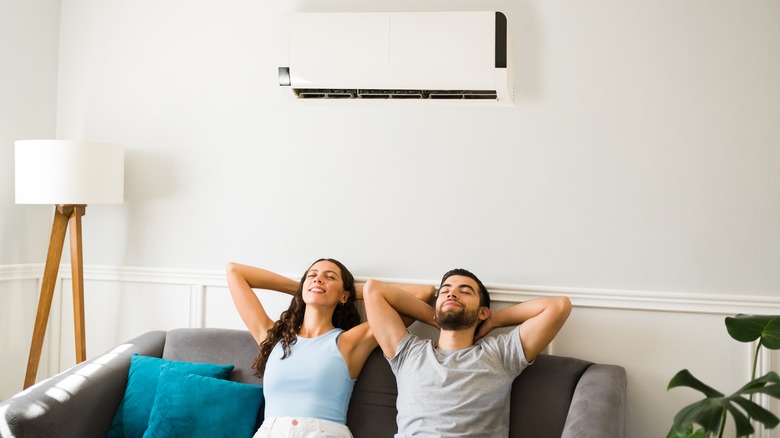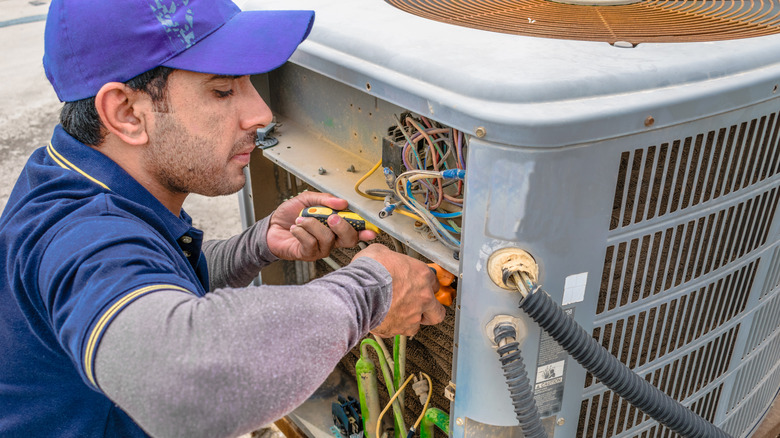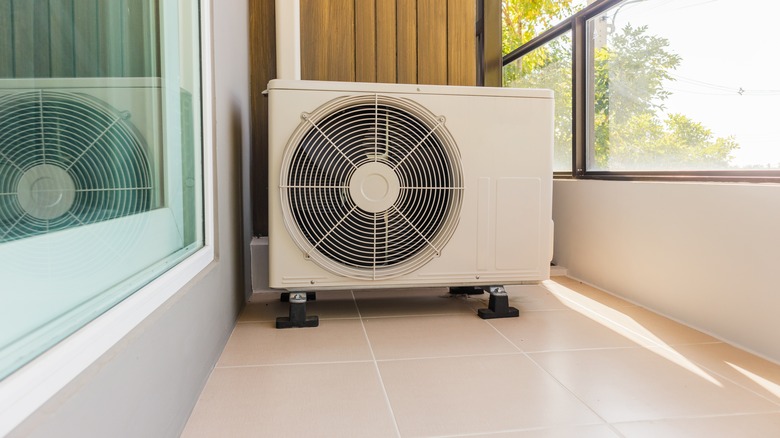All Your Big Questions About Picking The Right AC Unit For Your Home, Answered
There are so many different types of AC units to choose from. It's easy to become overwhelmed by choice. Each type of unit is designed to meet the needs of a specific budget and lifestyle. For example, if you grew up in a home with a ducted air conditioning system, buying a home without any temperature control might seem barbaric. Yet depending on your budget, what truly is the best time of system for you? What if you don't spend much time at home and don't want to pay thousands of dollars each year to cool down a building you're not even in? What if you're renting and need a low-cost, low-maintenance option so you don't have to swelter through yet another summer?
Our air conditioning experts are here to walk you through the pros and cons of each system, as well as questions about air conditioner replacement costs, potential increases to electricity bills, and whether or not you really can DIY AC. There is not one size fits all solution to temperature control, but by fully understanding your options, you can choose the best one for you.
What are the pros of ducted air conditioning?
Ducted air conditioning, also known as central air, is one of the most common AC systems in the United States. There is one central motor outside the home which helps generate the cold air. The breeze is then moved throughout the rest of the house by a complex network of ducts and vents. The system is centrally controlled by one thermostat inside the home.
The main benefit of ducted air conditioning is the ability to keep your entire house at a comfortable temperature at the same time. You only have to use one thermostat, one remote, one motor, etc. Ducted systems also tend to be quieter than other options because the breeze from the vents is gentle instead of rattling. In addition, the motor is typically set back far enough from the house to reduce noise. Modern ducted systems also allow you to split the house up into "zones" by opening and closing the ducts in certain spots, so you don't waste energy cooling unused rooms, like guest spaces or studies.
What are the cons of ducted air conditioning?
The main drawback of installing ducted air conditioning is the time, effort, and investment it takes to get it going. If your home doesn't already have ductwork installed, it can be an expensive undertaking to do so. This is because you must hire a contractor to rip out substantial portions of your ceiling, install ducts and vents in each room, and hook up complex electrical wiring. It's even more intricate if you live in a two-story home, as the same must be done on the floors of the upper living area as well.
Due to these requirements, some homes are simply too small to accommodate a complex duct system and vents. Homeowners that do have the square footage might also still feel a little uncomfortable at the sticker shock of installing a system. Typical systems are well into the thousands. Not all ducted systems can be "zoned," either, meaning you will always need to pay to cool your entire house, rather than just certain rooms.
What are the pros of split (ductless) systems?
Ductless air conditioning units are sometimes called split or mini-split AC systems. The main benefit of this system is you don't have to undergo a major renovation to install it. In just one afternoon, you can go from having no temperature control in your home to being able to create the perfect environment in certain rooms whenever you want it.
Split systems can also come to the rescue when your home already has ductwork, but the quotes you've been getting to update the existing parts are way out of your budget. The split system is a great compromise between respecting your budget and your need to be comfortable. Even if you don't have ducts in your home, split systems can be installed room-by-room over time so you can raise money in between units if you need to without having to suffer in the heat in the meantime. They also work well for those of us who live in climates with short periods of intense heat. Installing a ducted system might seem like an overreaction to the short burst of weather, but you still need something permanent to count on each year.
What are the cons of split (ductless) systems?
The main drawback of these ductless systems is that they only control the temperature in one room. If you want cool air throughout your entire house, you will need to install multiple units which can get costly if done all at once. The units themselves are also quite large. The inside component of the unit takes up a lot of room on the wall, which can get in the way of shelves and paintings. Their presence can even influence where you can place the furniture. On the outside of your home, you also have to make sure there is a space for the compressor for each unit. Whereas ducted air conditioners only have one, ductless systems each need their own.
Some owners of split systems have complained that because the motor for the unit is in the room with you, the machines can be a little bit nosy. If you are sensitive to whirring or clicking, this could easily be frustrating to you. The final drawback is that sometimes the cold air blows directly onto you, causing discomfort as you are in such close proximity to the machine.
What are the pros of window units?
Window AC units are small boxes that sit on the window sill. You leave the window about halfway up and the machine seals the opening. It draws air from the outside into one room to cool it. They are typically priced at just a few hundred dollars, making them budget-friendly. The main benefit of a window unit is that's perfect for apartment dwellers or anyone who just needs to cool down one room. If you live with roommates and just want your personal space comfortable, consider a window unit. They are available to purchase both online or at any local home goods store, so you can get one on short notice.
Window units are also relativity cheap to run. They have a low overall wattage which uses less electricity than a larger AC unit. You also don't have to do much to maintain a window unit. You should clean its coils and filters about twice a year, but other than that they are a set-and-forget type of solution.
What are the cons of window units?
There is always the risk that an improperly installed window unit could fall. If it falls from a ground-floor window, the risk is minimal. If you live higher up, there is potential for severe damage to property or even loss of life should it come crashing down. However, even for those living on the ground floor, window units also pose a security risk as the window cannot be closed. If you are a homeowner, you might be able to seal around the unit with caulk or boards, but renters are left completely vulnerable because they cannot make renovations.
In addition, the water from a window unit tends to drain straight down. If your unit is behind the house, this might not matter as it would drain into a flowerbed or alleyway. But if you face a busy street or a shared outdoor porch, you might have to deal with a few frustrated neighbors around your drainage. Finally, some people tend to think window units, because of their bulky size, are very ugly to look at on the outside of a home.
What are the pros of portable units?
Portable AC units tend to be a great first step into using climate control at home. They usually run a bit cheaper than window units. They are small and usually on wheels. Unlike a window unit, there is a small hose that attaches through a crack in the window to draw air into the room, which the machine then cools down. They are the least expensive option by far and can be easily purchased online or at local home goods or hardware stores. Portable AC machines tend to be low in overall wattage, which means they are not expensive to run, either.
The main benefit that portable AC users tend to highlight is the "leave no trace" aspect of the machine. If you are renting, staying at a friend's house, or even popping into the office for a bit, you can bring the machine with you. Just plug it in, attach the intake hose to a nearby window, and voila! Cool air all day long. When it's time to move on, you can reverse the steps and no one (not even your landlord or nosy boss) will even know the machine was there at all.
What are the cons of portable units?
Although you can move a portable AC unit with you from room to room, you can still only cool one area at a time. Just like a window unit, leaving the window open even just a crack can still present significant security concerns, especially if you live on the ground floor. Portable AC units can also be quite loud, depending on their quality. So if you don't like the constant hum of a machine in a small space with you, you might grow frustrated.
Due to their small size and low wattage, a portable AC unit might not be as effective in bringing the temperature down as a larger, more powerful system. If you like things freezing inside even during the most intense heat wave, the experience just won't cut it. You also have to keep a close eye on the machine's drainage. Although most units have an in-built draining pan, if you run the machine often it has the potential to overflow, causing mold and water damage.
What air conditioner should I choose if I am renting?
If you are renting, your options for installing ac units in your home are more limited than that of a homeowner. Of course, you can always speak to your landlord and request a ducted or split system operating system be installed. However, if that request is denied, you still have options. Each option you choose should be evaluated against the potential threat to your security deposit.
The best choice for renters is a portable air conditioning unit. Typically, the only part of the machine that touches the walls or windows is the intake hose. This leaves you with less of a chance of causing any damage to the home and losing part of your security deposit. While window units are not permanent, there is a possibility of mold growing around them on the windowsill, cracking or scuffing to the windowsill, or even damage to the window panes or frame. Even the most careful of tenants cannot guarantee that their landlord won't try to charge them for damage from a window unit.
The final safety tip for tenants deciding to install an air conditioning unit is to consider investing in a drip pan. When setting up the machine, pay special attention to any sweating or drainage that might occur. Set up the drip pan to prevent mold from growing or moisture from accumulating, thus causing damage to your rental that you might be held liable for.
How much will an AC unit increase my electricity bill?
If you are used to managing the summer heat with dips in the pool or running a few fans, your electricity bill doesn't increase much when it heats up outside. It's normal to be a little apprehensive about how much you will need to budget once you start using air conditioning.
To determine how much your new air conditioner will cost you in terms of energy usage, you need to look back over old power bills. How much are you currently paying per kilowatt-hour (kWh)? This price changes quite a bit based on where you live, but the national average is roughly 14 cents. Next, check the wattage of the machine you are interested in buying. Let's say your unit is a 1500-watt unit. If you run it every single day for 24 hours, you will use 36 kWh (number of watts x number of hours / 1000). If you are paying 14 cents per kWh, it will cost you $5.04 a day to run it, or $151.20 per 30 days. By checking your math ahead of time, you will never need to be surprised by a high power bill.
How do I choose which room to install the AC unit?
If you are not installing a ducted air conditioning system, you must choose which rooms you want to be cooled. If you have the budget for multiple machines, this question is a lot easier to answer. Yet if you only have one unit, choosing between the bedroom for a good night's sleep and the living room for a comfortable rest of your day can be tricky. There is no right answer, as all of our preferences vary. The key is to discover what level of comfort is more important to you individually.
If you work from home, you might prefer having the AC unit in your living and working area. This way, whether you are in a three-hour video conference or enjoying your favorite TV show after you clock off, the temperature is right for you. You might also choose the living area if you enjoy entertaining, as the heat from all the bodies in a small space can easily get overwhelming even with a fan or two. However, if you live alone and work outside of the home (or just tend to run hot while you sleep), place the unit in your bedroom for the best results.
Should I hire someone to install the AC unit?
You only need to hire someone to install your AC unit for ducted or mini-split systems. As mentioned, these systems require more in-depth construction to work correctly. Even if you have some DIY general contracting experience under your belt (perhaps you installed the tiling in your entryway or repainted your entire home) anything to do with electricity requires a bit more skill than these lower-stakes projects. Should you get your wires crossed when installing an AC unit, you not only risk starting an electrical fire in your home, but you could also cause serious injury to yourself. To minimize risk, always hire a professional.
If you have purchased a window unit or a portable air conditioner, you can probably set it up with minimal help. You might need at least one other pair of hands to properly install a window unit as lifting and balancing the machine can be difficult. For a portable air conditioner, most folks find that ensuring the hose is attached and the machine is cooling properly is entirely a one-person job.
What air conditioning system is the least expensive to install?
The least expensive AC system to install is the portable air conditioner. You can do it alone and don't need to pay for any labor. Just above it in price is the window unit which you might be able to do alone, but should consider paying a friend with dinner to help you, just in case.
The bigger bills start coming in due to the more intricate installation of larger AC systems. For example, if you choose a split-system air conditioner, your final price varies based on the number of rooms the unit covers. One room will run you roughly $1,600 to $3,500, plus the cost of the machine. If you decide to have one in five rooms, you are looking at about $9,600 to $13,000 and it only goes up based on the size of the building.
Installing ducted air conditioning is even more expensive, but fans of the system insist the cost is worth the benefits in the end. For a small home or an apartment, you will pay about $5,000. For a home that's just one floor, budget anywhere from $6,000 to $10,000. For a two-story home, there are more variables to installing ducts correctly, so the price could be north of $14,000. If price is a major factor in your decision, be sure to get quotes for each kind of system from at least two contractors to compare.
Does an AC unit impact the value of my home?
AC units tend to increase the overall value of a home. If you are installing a system into your home, but don't plan on living there forever, you are likely to make the money you invested back when you sell. Selling a home with a brand new AC system can add up to 10% more value to the house's final sale price versus a home with an older system. It follows that this return on investment would only increase when selling a home with an AC system against no climate control at all.
Potential buyers will likely be doing the mental math of installing an air conditioner themselves anyway and wanting to deduct that cost from their offer. An AC unit also makes it easier to market your home as a desirable place to live. The lifestyle boost temperature control can provide is an enviable one, particularly if you are selling in an area with consistently warm weather, like Texas, Florida, or Arizona.
